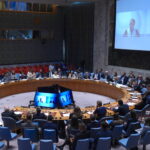Amos’ closing act: Africa
After negotiating a cease-fire between Israel and Hezbollah, the Biden confidant adds an African economic project to his legacy

JOSEPH EID/AFP via Getty Images
U.S. Special Envoy Amos Hochstein looks on during a meeting with Lebanon's caretaker prime minister in Beirut on November 7, 2023.
When Israel and Hezbollah agreed last month to a cease-fire deal to stop the fighting that caused devastation in southern Lebanon and northern Israel, White House aide Amos Hochstein could breathe a sigh of relief. The Biden confidant had finally negotiated the accord that had eluded him for more than a year.
But the completion of the cease-fire deal did not mean Hochstein could return to Washington and ride out the remainder of President Joe Biden’s term quietly ensconced at the White House. Instead, Hochstein traveled with the president this week to Angola, where he could see through another major accomplishment before Jan. 20.
It was a stunning two weeks for Hochstein. He was a major figure in orchestrating Biden’s trip to the sub-Saharan African nation, according to two Biden administration officials, one of whom said Hochstein was “pretty key” to the trip. The visit marked the fulfillment of a promise Biden made two years ago at the Africa Leaders Summit that he would visit sub-Saharan Africa during his presidency, the first time a U.S. president had traveled there since Barack Obama in 2015.
During the trip, Biden heralded the growing ties between the U.S. and Angola, which has become an important U.S. partner in recent years as the U.S. seeks to counter China’s influence in Africa. That was the thinking behind the Lobito Corridor, an ambitious rail project that will transport critical minerals across Africa and of which Hochstein was a crucial architect. (Hochstein declined to comment.)
“It’s a grand vision, a big vision, and one that, when complete, will have meaningful impact, not just for the governments that are participating in it, but for all the people and communities along the route,” said one White House official. “This visit obviously had a major focus on the development of a new economic and investment-based approach to partnerships that align really nicely with Amos’ portfolios and work that he’s been doing.”
On Wednesday, Hochstein moderated a forum at the Lobito Corridor Trans-Africa Summit in Benguela, Angola, where the leaders of the nations involved in the Lobito Corridor, including Biden, spoke. Biden announced an additional $600 million in financing for the rail project.
Midway through the conversation, Zambian President Hakainde Hichilema traced the crux of the project to a visit from Hochstein, recalling “the map that we drew in my dingy office in Lusaka when Amos visited.” Samaila Zubairu, CEO of the Africa Finance Corporation, described meeting Hochstein in 2022. “We agreed, in not so many words, that we’ll do something together that will have a generational impact on our two continents,” said Zubairu.
While Hochstein is well-known to those who follow Middle Eastern geopolitics, his work negotiating between Israel and Lebanon technically falls outside his job description. As Biden’s senior advisor for energy and investment, his day job is to drive major infrastructure projects around the world, with U.S. funding and private investment.
So how did an energy expert who advised the president on global investment opportunities become Biden’s right-hand man on negotiations between Israel and Lebanon?
Two years ago, Hochstein resolved a long-running dispute between Israel and Lebanon over the nations’ maritime boundaries. While it may have looked like a diplomatic matter, it was also an economic issue: The drawing of the boundary would affect each nation’s claims to lucrative natural gas fields in the Mediterranean.
“Amos had done this before. He already knew a lot of the players there, was already respected,” said a U.S. official. “I think that is one of the key things that made this so effective, is when Amos would go out there and talk and negotiate, people knew that they could trust him because he had been successful in the maritime negotiations.”
However skilled a negotiator Hochstein is, he only succeeded in the projects because he has Biden’s trust. Hochstein touted that relationship in his own remarks at the Trans-Africa Summit.
“President Biden has told me that he is not a patient man and that, when he wants to deal with infrastructure, he wants it to happen as soon as possible. That is true in the United States. It is surely true here as well,” said Hochstein.
Former U.S. Ambassador to Israel Tom Nides, who was in Jerusalem during the maritime negotiations, said Hochstein made it into Biden’s “inner circle.”
“It’s not easy getting into the Biden inner circle,” Nides told Jewish Insider in January, “but [Hochstein] is certainly part of it.”






























































